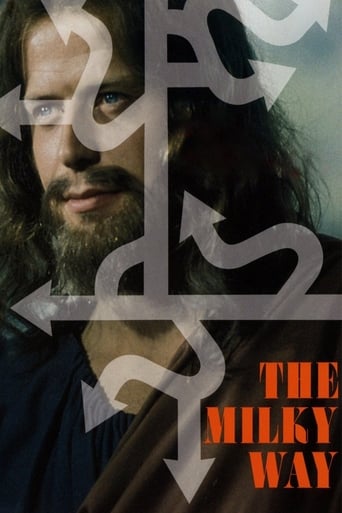Two men, part tramp, part pilgrim, are on their way to Santiago de Compostela in Spain. On their way they meet a whole assortment of people—some truculent, some violent, and some bizarre; they experience many adventures—some mysterious, some erotic, some even supernatural.
"La Voie lactée," a 1969 cinematic masterpiece co-produced by Fraia Film and Greenwich Film Production across Germany and France, is a surreal journey through the realms of faith and philosophy. Directed by the visionary Luis Buñuel, the film follows two tramps as they traverse the French countryside, their path mirroring the Milky Way. This narrative serves as a canvas for Buñuel to explore and satirize centuries of Catholic dogma, blending historical vignettes with contemporary scenes to create a tapestry of religious inquiry and human absurdity. The film's structure is ingeniously non-linear, weaving together episodes from different eras, including the life of Jesus, the Council of Trent, and the Spanish Inquisition. These historical interludes are juxtaposed with the tramps' modern-day encounters, creating a dialogue between past and present that challenges the viewer's perceptions of religious orthodoxy. Buñuel's signature surrealism is evident in the film's dreamlike sequences, where reality and fantasy blur, prompting audiences to question the nature of belief and the constructs of morality. "La Voie lactée" is notable for its bold critique of religious institutions, a theme that Buñuel had explored throughout his career. The film does not shy away from controversial topics, such as the Virgin Birth and the nature of the Trinity, presenting them with a mix of humor and irreverence. This approach not only entertains but also provokes thought, encouraging viewers to reflect on the contradictions and complexities within religious teachings. Despite its provocative content, "La Voie lactée" remains a testament to Buñuel's artistic prowess, blending intellectual depth with cinematic innovation. The film's international co-production reflects its universal themes, resonating with audiences across different cultures and belief systems. As a work of art, it continues to inspire and challenge, cementing its place as a significant contribution to the world of cinema and the ongoing discourse on faith and reason.
Year1969
Runtime102 min
GenresComedyDrama
Production countriesGermanyFranceItaly
